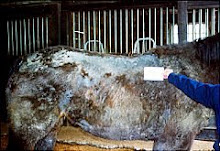On the eve of the 135th Derby in Kentucky, an expert in retraining former race horses for second careers says more thoroughbreds are in danger of going to the slaughterhouse.
Every day we see more and more thoroughbreds sold to be slaughtered
These are animals that have often earned millions of dollars during their racing careers.
What makes this situation even more tragic is that we see so many healthy, young thoroughbreds shipped abroad to be slaughtered
These are horses that are perfectly able to perform well at second careers as pleasure or show horses.
If enough people contributed even a single dollar to horse charities that would help us save so many animals from certain deaths or starvation
Monroe, WA (PRWEB) April 14, 2009 -- On May 2 some of the world's fastest thoroughbreds will race in Kentucky's annual Derby. Yet Melodee Shelley-Bolmgren, founder of the nonprofit organization Chez Chevaux, which rescues and retrains thoroughbreds, says that ex-racers are in greater danger than they have been in years of being sold for slaughter and today announced the Derby Dollar Challenge to raise funds to support expanded thoroughbred rescue.
"Every day we see more and more thoroughbreds sold to be slaughtered," Shelley-Bolmgren says. "These are animals that have often earned millions of dollars during their racing careers." She says Chez Chevaux has received record numbers of calls in recent months from horse owners who can no longer care for their animals.
Shelley-Bolmgren says it costs thousands of dollars to care for a horse each year and, unlike cats or dogs, unwanted horses are often shipped to Canada or Mexico to be sold for meat. "What makes this situation even more tragic is that we see so many healthy, young thoroughbreds shipped abroad to be slaughtered," she says. "These are horses that are perfectly able to perform well at second careers as pleasure or show horses."
Like many other nonprofits, though, Chez Chevaux cannot take any more animals without additional funding as pleas for assistance have increased dramatically during the recession. She says even a dollar's contribution can help save their lives.
The Derby Dollar Challenge:
The inaugural Derby Dollar Challenge is attempting to raise $135,000 by May 2 in recognition of this year's running of the 135th Derby. Donors can make online contributions to Chez Chevaux. Contributions can be made via check or PayPal and are tax-deductible.
Shelley-Bolmgren says even small contributions from individuals help prevent the killing of thoroughbreds, noting that donors should not feel uncomfortable offering what they consider small amounts. "If enough people contributed even a single dollar to horse charities that would help us save so many animals from certain deaths or starvation," she says.
How to Contribute to the Derby Dollar Challenge:
A donation of just a dollar can help save the lives of animals. To take the Dollar Challenge, please go to Chez Chevaux: www.chezchevaux.org.
Facts about Horse Slaughter:
During the last few decades, millions of horses have been slaughtered in the U.S. and Canada and their meat exported to Europe and Japan for human consumption.
It is estimated that a third of all slaughter-bound horses in the U.S. were bred for racing.
Young, sound and purebred horses, as well as those that are infirm and old, are sent to slaughter.
Thoroughbreds and other horses are often shipped up to 30 hours without food or water. When they reach the slaughterhouse, they are driven into a killing factory and bludgeoned with a four-inch bolt gun which drives a spike into their skulls. Their throats are then slit, often while they are still conscious.
Most horses sold at auction are bought by "killer buyers," middlemen for slaughter plants, and often go straight to slaughter without disclosure or the knowledge of the original sellers. Horse slaughter was often not the intent of the animal's owner.
Very little horse meat is used in dog food; it's too expensive, with some cuts selling for over $20 per pound.
Chez Chevaux rescues and retrains thoroughbreds. Founded by noted horsewoman, Melodee Shelley-Bolmgren, Chez Chevaux operates to retrain at-risk thoroughbreds, saving them from abuse and slaughter. Chez Chevaux is a 501C-3 nonprofit, which can be found on the Web at http://www.chezchevaux.org. Melodee is a frequent speaker at events such as The Homes for Horses coalition http://www.homesforhorses.org and has received numerous grants from groups such as the ASPCA and Thoroughbred Charities of America. A video detailing Melodee's efforts in rehabilitating a starving thoroughbred can be found at http://www.youtube.com/watch?v=2ddYDd8Lymw.
###
Click on title above to see vid;
http://www.prweb.com/releases/horseslaughter/kentuckyderby/prweb2323154.htm
Thursday, April 16, 2009
Subscribe to:
Post Comments (Atom)

















No comments:
Post a Comment